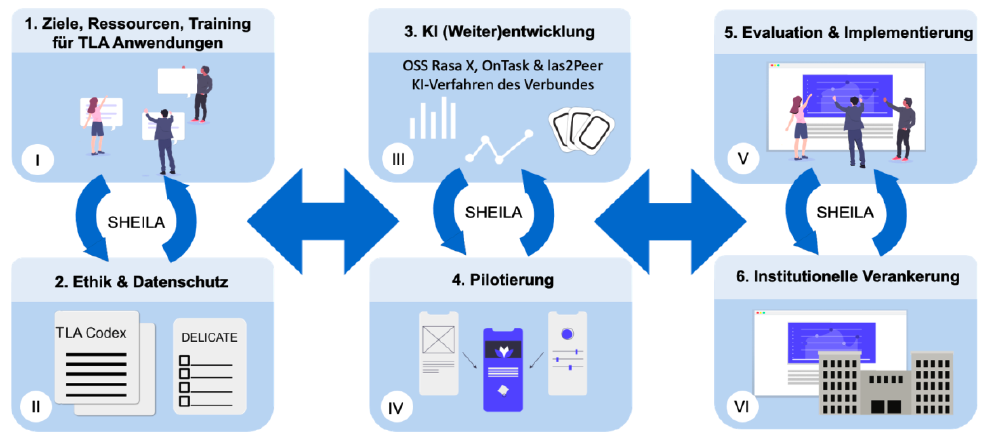 The EduTec group contributed to two winning research grants on AI in Higher Education for the upcoming four years. The Federal Ministry of Education and Research (BMBF) is thus strengthening Frankfurt as an excellent centre for educational technologies, especially AI in Education (Learning Analytics). The federal-state initiative “Artificial Intelligence in Higher Education” supports two projects at the Goethe University Frankfurt.
The EduTec group contributed to two winning research grants on AI in Higher Education for the upcoming four years. The Federal Ministry of Education and Research (BMBF) is thus strengthening Frankfurt as an excellent centre for educational technologies, especially AI in Education (Learning Analytics). The federal-state initiative “Artificial Intelligence in Higher Education” supports two projects at the Goethe University Frankfurt.
One of the projects is a cooperation project under the Goethe University Frankfurt direction, together with the University of Bremen, the FU Berlin, the HU Berlin, and the distance university in Hagen. The IMPACT project (IMPlementing AI-based feedbaCk and assessment with Trusted learning analytics in universities) is about the (partially) automated analysis of texts. Along the Student Life Cycle, prospective students, newcomers and students should receive text-based, highly informative and personalised feedback in the orientation and entry phase, during studies and at the end of course work. The IMPACT consortium will take advantage of various open-source projects and customise those for the consortium partners.
The consortium lead, Prof. Dr. Hendrik Drachsler, is looking forward to using new processes to support students and teachers to receive feedback on the scale. “We have developed various approaches to rollout AI or as I call it Learning Analytics on a scale. I am referring to technological platforms that we already run as mature prototypes, such as Chatbots or AI supported high-informative feedback systems, we also have developed a Code of Conduct for Learning Analytics to address the ethical, legal and social implications of the use of AI in education. In this project, we will have the opportunity to bring all these achievements together and roll them out in conjunction with our project partners in a user-centred manner.” The project is funded with a total of 5 million euros.
 Among the joint project, Goethe University also received another 2 Million Euro funding for the institutional project AI and digital Technologies in Learning and Instruction – (ALI) to set up a study programme on AI and digital technologies in the educational process. The ALI project will significantly benefit from the outcomes of the IMPACT project and establish a Master programme on AI for social science.
Among the joint project, Goethe University also received another 2 Million Euro funding for the institutional project AI and digital Technologies in Learning and Instruction – (ALI) to set up a study programme on AI and digital technologies in the educational process. The ALI project will significantly benefit from the outcomes of the IMPACT project and establish a Master programme on AI for social science.
The Deputy Chair of the Joint Science Conference, Anja Karliczek, Federal Minister of Education and Research, adds: “Artificial intelligence is one of the key technologies of the future. AI is already shaping our everyday lives in the form of a wide variety of applications, from voice recognition on mobile phones to semi-autonomous vehicles on our roads. This will become even stronger in the next decade. We need top experts in the field of artificial intelligence in Germany and Europe so that we can shape our lives in the future with technological sovereignty and in accordance with our European values. And we want the potential of artificial intelligence. We want to use the potential of artificial intelligence, for example, to individualise teaching and learning processes at universities. We want to be at the forefront of AI internationally and are investing heavily in this – as part of the Federal Government’s AI strategy, strengthened by the economic stimulus and future package, and now together with the Länder.”
A 32-member selection committee chaired by Dr. Andrea Grimm (Supervisory Board IBM Deutschland GmbH), assisted by Prof. Dr. Gesche Joost (UdK Berlin) and Prof. Dr. Manfred Prenzel (University of Vienna) as vice-chairs, decided on the selection of the applications. The selection committee consisted of 25 experts from science, business and society with proven experience and expertise in the field of artificial intelligence, university didactics and subject sciences, two representatives of the student body and two representatives each from the federal and state governments. In total 40 individual projects of higher education institutions and 14 joint projects of several higher education institutions are being funded within the framework of the Federal-Länder funding initiative “Artificial Intelligence in Higher Education”. The members of the initiative include experts from science, industry and society with proven experience and skills in the fields of artificial intelligence, higher education didactics and subject sciences, two representatives of the student body and two representatives each from the Federal Government and the Länder.
Further information can be found on the website of the Joined Science Conference GWK:
The outcomes of the review process can be found here.
